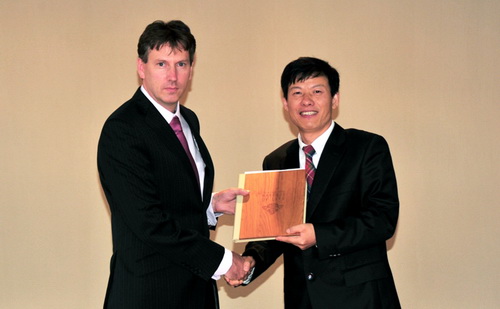On 29th May 2012 China signed a Memorandum of Understanding (MoU) with the international Barcode of Life (iBOL) at the Kunming Institute of Botany (KIB) in Yunnan, China. Prof. Dezhu Li, KIB director and representative of China National Committee for iBOL and Prof. Pete Hollingsworth, Chair of iBOL Scientific Steering Committee (iBOL-SSC) signed the MoU for the two parties. Representatives from Chinese Academy of Sciences (CAS) and the Ministry of Science and Technology of China (MOST) witnessed this important event. Among who attended the signing ceremony were Prof. Rong-hui Su, deputy director of CAS Bureau of Life Sciences and Biotechnology (BLSB), Prof. Qing-li Wang, president of CAS Kunming Branch, Dr. Wen-jun Chen, division head of Department of Basic Research of MOST, and Dr. Zhi-ping Lou, division head of CAS-BLSB. The signing ceremony was chaired by Prof. Wen Wang, deputy director of CAS Kunming Institute of Zoology (KIZ).
Prof. Rong-hui Su and Dr. Wen-jun Chen gave speeches on behalf of CAS-BLSB and MOST Department of Basic Research, respectively. Su said that, as a new technology for species identification, DNA barcoding has great applications for both science and societies. The CAS is a main driving force in DNA barcoding in China. Under the leadership of iBOL-China National Committee, institutions of CAS made considerable progresses in many fields on barcode of life, including technique standardizations of molecular experiments, development of molecular markers for seed plants and fungi, as well as other microorganisms, vertebrates, invertebrates. China also made great effort in core facilities construction, and informatics mirror system and data mining platform. The CAS will promote related institutes to complete the target under this MoU. Su hopes that the Central Nodes of China, Canada, Europe and America will work more closely together, towards the making of final map of iBOL. Chen highlighted that as the major official funding agency of basic research in China, MOST plays a pivotal role in the development of DNA barcoding in China. MOST had started several major projects to enhance China’s development of DNA barcoding. These projects included “technology standardization and informatics system construction of DNA barcoding in several important organism groups”, “DNA barcoding nature reserves”, and ”DNA barcoding of fishes in China”. Chen pointed out that MOST will work together with CAS, and National Natural Science Foundation of China (NSFC), to support iBOL activities in China. Chen also hopes Chinese scientists could play greater roles in the international cooperation in the iBOL framework.
Considering the current situation of global economy, the Chinese Central Node still has a long way to go. Both of the representatives of China and iBOL made speeches in the end. Prof. Dezhu Li and Prof. Pete Hollingsworth looked back the big progresses since China joined in the iBOL initiatives in 2008 and expressed the willingness to work more closely towards the iBOL targets.
The iBOL project was initiated by Canadian Scientist Paul Hebert. The main target for iBOL project is to build a global barcode library including 50K species in five years, and to establish easy and general pipelines and standards. Academician Ya-ping Zhang, vice-chair of the iBOL China National Committee, had attended the launching ceremony of iBOL in 2010. Dr. Xian-en Zhang, director of Department of Basic Research of MOST, as the Chinese representative in the Board of Directors of iBOL, participated the making and management of iBOL strategy and road map. Before the midpoint of iBOL project in this September, this newly signed MoU will enhance China’s commitment and promote the applications of DNA barcoding in China.

Prof. Dezhu Li and Prof. Pete Hollingsworth, as the representatives of China and iBOL respectively, signed and exchange the MOU.
Prof. Rong-hui Su, the deputy director of Bureau of Life Sciences and Biotechnology of Chinese Academy of Sciences, gave a welcome speech.
Dr. Wen-jun Chen, division head of Department of Basic Research of the Ministry of Science and Technology of China, highlights the progresses of DNA
Group photo of attendees.





